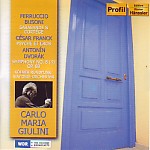The second half of the finale of Dvorák’s Eighth Symphony consists of a series of sweetly lazy variations that can sound very repetitious if taken too slowly, particularly since in most of them both halves of the theme are marked to be repeated (one has a written-out second half). We owe a debt of gratitude to Giulini for proving once and for all that observing the repeats is critical, for when you don’t, as is the case here, the result comes across as even more repetitious, not less. This is because the tune itself, shortened by half, sounds pointless played three or four times straight through with minimal variation, whereas when performed as written, the feeling of indolent timelessness that Dvorák surely intended justifies the music’s apparent inactivity.
This, then, is a big caveat that you need to be aware of if you purchase this disc. A smaller one concerns the 1958 mono sound, which is nevertheless very clear and perfectly acceptable for its day. So why do I recommend this performance anyway? Simply because this has to be the most physically exciting rendition of the symphony that you will ever hear, at least until the second half of the finale. Giulini drives the outer movements as much as he possibly can, with the orchestra audibly hanging on for dear life (the timpanist gets lost at one point in the finale’s scherzo variation). But the players manage to keep up most of the time, with unbelievably thrilling results in the first movement and an unquenchable vitality in the two inner movements. If you love this symphony you will certainly want to hear this interpretation, particularly as it couldn’t be more different from Giulini’s three subsequent, slower, and infinitely more studied studio remakes.
The couplings, dating from 1971 and benefiting from more modern sonics, are very well done. Giulini finds a great deal of atmospheric poetry in the Busoni Sarabande (for my money his finest single orchestral movement), and the Franck is sexy but never shapeless or pointlessly dragging. I’m not sure that Giulini would have wanted this version of the Eighth to be released; in a sense, it really doesn’t do justice to what came to be his vision of the work. But as a one-time snapshot of the conductor in an uncharacteristically unbuttoned and spontaneous mood, playing fast and loose with a score he obviously loved, this disc provides the musical equivalent of a naughty thrill.
































